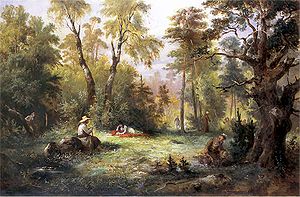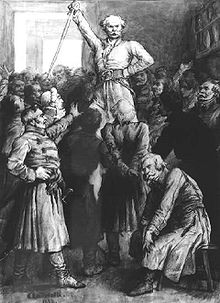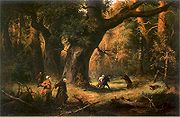
Pan Tadeusz
Encyclopedia
Pan Tadeusz, the full title in English
: Sir Thaddeus, or the Last Lithuanian Foray: A Nobleman's Tale from the Years of 1811 and 1812 in Twelve Books of Verse (Polish original
: Pan Tadeusz, czyli ostatni zajazd na Litwie. Historia szlachecka z roku 1811 i 1812 we dwunastu księgach wierszem) is an epic poem by the Polish poet, writer and philosopher Adam Mickiewicz
. The book was first published in June 1834 in Paris
, and is considered by many to be the last great epic poem in European literature
.
Pan Tadeusz is recognized as the national epic
of Poland
. It is compulsory reading in Polish schools. A film based on the poem
was made in 1999 by Andrzej Wajda
.

 The story takes place over the course of five days in 1811 and one day in 1812, at a time in history, when Poland-Lithuania
The story takes place over the course of five days in 1811 and one day in 1812, at a time in history, when Poland-Lithuania
had already been divided between the armies of Russia
, Prussia
, and Austria
(see Partitions of Poland
) and erased from the political map of Europe, although in 1807, just before the story begins, Napoleon had established a satellite Duchy of Warsaw
in the Prussian partition
, in existence until the Congress of Vienna
held in the aftermath of Napoleonic defeat.
The place is situated within the Russian partition, in the village of Soplicowo; the country estate of the Soplica clan. Pan Tadeusz recounts the story of two feuding noble families, and the love between Tadeusz Soplica (the title character) of one family, and Zosia of the other. Another sub-plot involves a spontaneous revolt of the local inhabitants against the occupying Russian garrison
. Since Mickiewicz published his poem as an exile in Paris, he was free of the Russian censors to talk openly about the occupation.
The fact that the Polish national poem begins with words "O Lithuania" largely stems from the fact that the 19th century concept of nationality
had not yet been geopoliticized
in his time. The term "Lithuania
" used by Mickiewicz refers rather to a geographical region and not country. It had a much broader geographic extent than it does now (i.e. the modern Lithuania
), and it did refer to the historical Lithuania proper
. He is often regarded by Lithuanians to be of Lithuanian origin, while Belarusians proclaim Mickiewicz to be one of them, since he was born on the territory of contemporary Belarus.
, a multicultural state that had encompassed most of what today are the separate countries of Poland
, Lithuania
, Belarus
and Ukraine
. Numerous quotations from Pan Tadeusz are well known in translation, above all its opening lines:
 Maude Ashurst Biggs published "Master Thaddeus" in 1885 in London, Watson Kirkconnell
Maude Ashurst Biggs published "Master Thaddeus" in 1885 in London, Watson Kirkconnell
"Sir Thaddeus" in 1962. George Rapall Noyes published the poem in 1917 in prose. At least Book Four was published in 2000 by Christopher Adam Zakrzewski. A full version translation by Marcel Weyland, in the original metre, was published in Sydney in 2004, London and New York in 2005 (ISBN 1567002196 US, and 1873106777 UK).
The first translation of the poem into a different language, Belarusian
, was made in 1859 by the Belarusian writer and dramatist Vintsent Dunin-Martsinkyevich, in Wilno. Because of the pressure from Tsarist
authorities Dunin-Martshinkyevich was able to only publish the first two chapters of the poem.
made by Andrzej Wajda
in 1999 was his great cinematic success in Poland.
English language
English is a West Germanic language that arose in the Anglo-Saxon kingdoms of England and spread into what was to become south-east Scotland under the influence of the Anglian medieval kingdom of Northumbria...
: Sir Thaddeus, or the Last Lithuanian Foray: A Nobleman's Tale from the Years of 1811 and 1812 in Twelve Books of Verse (Polish original
Polish language
Polish is a language of the Lechitic subgroup of West Slavic languages, used throughout Poland and by Polish minorities in other countries...
: Pan Tadeusz, czyli ostatni zajazd na Litwie. Historia szlachecka z roku 1811 i 1812 we dwunastu księgach wierszem) is an epic poem by the Polish poet, writer and philosopher Adam Mickiewicz
Adam Mickiewicz
Adam Bernard Mickiewicz ) was a Polish poet, publisher and political writer of the Romantic period. One of the primary representatives of the Polish Romanticism era, a national poet of Poland, he is seen as one of Poland's Three Bards and the greatest poet in all of Polish literature...
. The book was first published in June 1834 in Paris
Paris
Paris is the capital and largest city in France, situated on the river Seine, in northern France, at the heart of the Île-de-France region...
, and is considered by many to be the last great epic poem in European literature
European literature
European literature refers to the literature of Europe.European literature includes literature in many languages; among the most important of the modern written works are those in English, Spanish, French, Dutch, Polish, German, Italian, Modern Greek, Czech and Russian and works by the...
.
Pan Tadeusz is recognized as the national epic
National epic
A national epic is an epic poem or a literary work of epic scope which seeks or is believed to capture and express the essence or spirit of a particular nation; not necessarily a nation-state, but at least an ethnic or linguistic group with aspirations to independence or autonomy...
of Poland
Poland
Poland , officially the Republic of Poland , is a country in Central Europe bordered by Germany to the west; the Czech Republic and Slovakia to the south; Ukraine, Belarus and Lithuania to the east; and the Baltic Sea and Kaliningrad Oblast, a Russian exclave, to the north...
. It is compulsory reading in Polish schools. A film based on the poem
Pan Tadeusz (film)
Pan Tadeusz: The Last Foray in Lithuania is a 1999 Polish film directed by Andrzej Wajda. It is based on the eponymous epic poem by Polish poet, writer and philosopher Adam Mickiewicz . In his film, Andrzej Wajda weaves the tangled passions of men and women into a handsome, expansive tapestry of...
was made in 1999 by Andrzej Wajda
Andrzej Wajda
Andrzej Wajda is a Polish film director. Recipient of an honorary Oscar, he is possibly the most prominent member of the unofficial "Polish Film School"...
.
Content


Polish-Lithuanian Commonwealth
The Polish–Lithuanian Commonwealth was a dualistic state of Poland and Lithuania ruled by a common monarch. It was the largest and one of the most populous countries of 16th- and 17th‑century Europe with some and a multi-ethnic population of 11 million at its peak in the early 17th century...
had already been divided between the armies of Russia
Russia
Russia or , officially known as both Russia and the Russian Federation , is a country in northern Eurasia. It is a federal semi-presidential republic, comprising 83 federal subjects...
, Prussia
Prussia
Prussia was a German kingdom and historic state originating out of the Duchy of Prussia and the Margraviate of Brandenburg. For centuries, the House of Hohenzollern ruled Prussia, successfully expanding its size by way of an unusually well-organized and effective army. Prussia shaped the history...
, and Austria
Austria
Austria , officially the Republic of Austria , is a landlocked country of roughly 8.4 million people in Central Europe. It is bordered by the Czech Republic and Germany to the north, Slovakia and Hungary to the east, Slovenia and Italy to the south, and Switzerland and Liechtenstein to the...
(see Partitions of Poland
Partitions of Poland
The Partitions of Poland or Partitions of the Polish–Lithuanian Commonwealth took place in the second half of the 18th century and ended the existence of the Polish–Lithuanian Commonwealth, resulting in the elimination of sovereign Poland for 123 years...
) and erased from the political map of Europe, although in 1807, just before the story begins, Napoleon had established a satellite Duchy of Warsaw
Duchy of Warsaw
The Duchy of Warsaw was a Polish state established by Napoleon I in 1807 from the Polish lands ceded by the Kingdom of Prussia under the terms of the Treaties of Tilsit. The duchy was held in personal union by one of Napoleon's allies, King Frederick Augustus I of Saxony...
in the Prussian partition
Prussian partition
The Prussian partition refers to the former territories of the Polish-Lithuanian Commonwealth acquired during the partitions of Poland in the late 18th century by the Kingdom of Prussia.-History:...
, in existence until the Congress of Vienna
Congress of Vienna
The Congress of Vienna was a conference of ambassadors of European states chaired by Klemens Wenzel von Metternich, and held in Vienna from September, 1814 to June, 1815. The objective of the Congress was to settle the many issues arising from the French Revolutionary Wars, the Napoleonic Wars,...
held in the aftermath of Napoleonic defeat.
The place is situated within the Russian partition, in the village of Soplicowo; the country estate of the Soplica clan. Pan Tadeusz recounts the story of two feuding noble families, and the love between Tadeusz Soplica (the title character) of one family, and Zosia of the other. Another sub-plot involves a spontaneous revolt of the local inhabitants against the occupying Russian garrison
Garrison
Garrison is the collective term for a body of troops stationed in a particular location, originally to guard it, but now often simply using it as a home base....
. Since Mickiewicz published his poem as an exile in Paris, he was free of the Russian censors to talk openly about the occupation.
The fact that the Polish national poem begins with words "O Lithuania" largely stems from the fact that the 19th century concept of nationality
Nationality
Nationality is membership of a nation or sovereign state, usually determined by their citizenship, but sometimes by ethnicity or place of residence, or based on their sense of national identity....
had not yet been geopoliticized
Geopolitics
Geopolitics, from Greek Γη and Πολιτική in broad terms, is a theory that describes the relation between politics and territory whether on local or international scale....
in his time. The term "Lithuania
Lithuania
Lithuania , officially the Republic of Lithuania is a country in Northern Europe, the biggest of the three Baltic states. It is situated along the southeastern shore of the Baltic Sea, whereby to the west lie Sweden and Denmark...
" used by Mickiewicz refers rather to a geographical region and not country. It had a much broader geographic extent than it does now (i.e. the modern Lithuania
Lithuania
Lithuania , officially the Republic of Lithuania is a country in Northern Europe, the biggest of the three Baltic states. It is situated along the southeastern shore of the Baltic Sea, whereby to the west lie Sweden and Denmark...
), and it did refer to the historical Lithuania proper
Lithuania proper
Lithuania proper refers to a region which existed within Grand Duchy of Lithuania, and spoke Lithuanian language. The primary meaning is identical to the Duchy of Lithuania, a land around which Grand Duchy of Lithuania evolved...
. He is often regarded by Lithuanians to be of Lithuanian origin, while Belarusians proclaim Mickiewicz to be one of them, since he was born on the territory of contemporary Belarus.
Fame
All works of Mickiewicz including Pan Tadeusz are in the Polish language. He had been brought up in the culture of the Polish-Lithuanian CommonwealthPolish-Lithuanian Commonwealth
The Polish–Lithuanian Commonwealth was a dualistic state of Poland and Lithuania ruled by a common monarch. It was the largest and one of the most populous countries of 16th- and 17th‑century Europe with some and a multi-ethnic population of 11 million at its peak in the early 17th century...
, a multicultural state that had encompassed most of what today are the separate countries of Poland
Poland
Poland , officially the Republic of Poland , is a country in Central Europe bordered by Germany to the west; the Czech Republic and Slovakia to the south; Ukraine, Belarus and Lithuania to the east; and the Baltic Sea and Kaliningrad Oblast, a Russian exclave, to the north...
, Lithuania
Lithuania
Lithuania , officially the Republic of Lithuania is a country in Northern Europe, the biggest of the three Baltic states. It is situated along the southeastern shore of the Baltic Sea, whereby to the west lie Sweden and Denmark...
, Belarus
Belarus
Belarus , officially the Republic of Belarus, is a landlocked country in Eastern Europe, bordered clockwise by Russia to the northeast, Ukraine to the south, Poland to the west, and Lithuania and Latvia to the northwest. Its capital is Minsk; other major cities include Brest, Grodno , Gomel ,...
and Ukraine
Ukraine
Ukraine is a country in Eastern Europe. It has an area of 603,628 km², making it the second largest contiguous country on the European continent, after Russia...
. Numerous quotations from Pan Tadeusz are well known in translation, above all its opening lines:
- Lithuania, my fatherland! You are like health;
- How much you must be valued, will only discover
- The one who has lost you.
-
- (translation by Katie Busch-Sorensen)
- O Lithuania, my country, thou
- Art like good health; I never knew till now
- How precious, till I lost thee.
-
- (translation by Kenneth R. MackenzieKenneth R. MackenzieKenneth R. Mackenzie British scholar and parliamentary clerk educated at Dulwich College and New College, Oxford. He was appointed Clerk to the House of Commons in 1930 and then Clerk to the Select Committee in the 1945-6 session, before becoming the Clerk of Public Bills until his retirement. He...
)
- (translation by Kenneth R. Mackenzie
- Lithuania, my country! You are as good health:
- How much one should prize you, he only can tell
- Who has lost you.
-
- (translation by Marcel WeylandMarcel WeylandMarcel Weyland is a translator of Adam Mickiewicz's Pan Tadeusz and of Echoes: Poems of the Holocaust. 'The Word: 200 Years of Polish Poetry', 2010, ed. Brandl & Schlesinger, Blackheath, NSW, Australia, ISBN 9781921556036.-Life:...
)
- (translation by Marcel Weyland
- Oh Lithuania, my homeland,
- you are like health--so valued when lost
- beyond recovery; let these words now stand
- restoring you, redeeming exile's cost.
-
- (translation by Leonard Kress)
Other translations

Watson Kirkconnell
Watson Kirkconnell, was a Canadian scholar, university administrator and translator. He is well known in Iceland, Eastern and Central Europe and among Canadians of different origins for his translations of their national poetry, particularly the Hungarians, Ukrainians, Russians, Serbians,...
"Sir Thaddeus" in 1962. George Rapall Noyes published the poem in 1917 in prose. At least Book Four was published in 2000 by Christopher Adam Zakrzewski. A full version translation by Marcel Weyland, in the original metre, was published in Sydney in 2004, London and New York in 2005 (ISBN 1567002196 US, and 1873106777 UK).
The first translation of the poem into a different language, Belarusian
Belarusian language
The Belarusian language , sometimes referred to as White Russian or White Ruthenian, is the language of the Belarusian people...
, was made in 1859 by the Belarusian writer and dramatist Vintsent Dunin-Martsinkyevich, in Wilno. Because of the pressure from Tsarist
Russian Empire
The Russian Empire was a state that existed from 1721 until the Russian Revolution of 1917. It was the successor to the Tsardom of Russia and the predecessor of the Soviet Union...
authorities Dunin-Martshinkyevich was able to only publish the first two chapters of the poem.
Film adaptations
The first film version of the poem as a feature was produced in 1928. The film versionPan Tadeusz (film)
Pan Tadeusz: The Last Foray in Lithuania is a 1999 Polish film directed by Andrzej Wajda. It is based on the eponymous epic poem by Polish poet, writer and philosopher Adam Mickiewicz . In his film, Andrzej Wajda weaves the tangled passions of men and women into a handsome, expansive tapestry of...
made by Andrzej Wajda
Andrzej Wajda
Andrzej Wajda is a Polish film director. Recipient of an honorary Oscar, he is possibly the most prominent member of the unofficial "Polish Film School"...
in 1999 was his great cinematic success in Poland.
External links
- Pan Tadeusz or The Last Foray in Lithuania: A Story of Life Among Polish Gentlefolk in the Years 1811 and 1812 in Twelve Books translated by George Rapall Noyes, 1917
- http://www.leonardkress.com Pan Tadeusz or the Last Foray in Lithuania: a History of the Nobility in the Years 1811 and 1812 in Twelve Books of Verse] translated by Leonard Kress
- Pan Tadeusz or The Last Foray in Lithuania: A Tale of the Gentry During 1811–1812 translated by Marcel Weyland, 2004
- Adam Mickiewicz. Sinjoro Tadeo, aŭ la lasta armita posedopreno en Litvo. Nobelara historio de la jaroj 1811 kaj 1812 en dekdu libroj verse esperanta.. Pan Tadeusz in Esperanto, translated by Antoni GrabowskiAntoni GrabowskiAntoni Grabowski was a Polish chemical engineer, and an activist of the early Esperanto movement...

